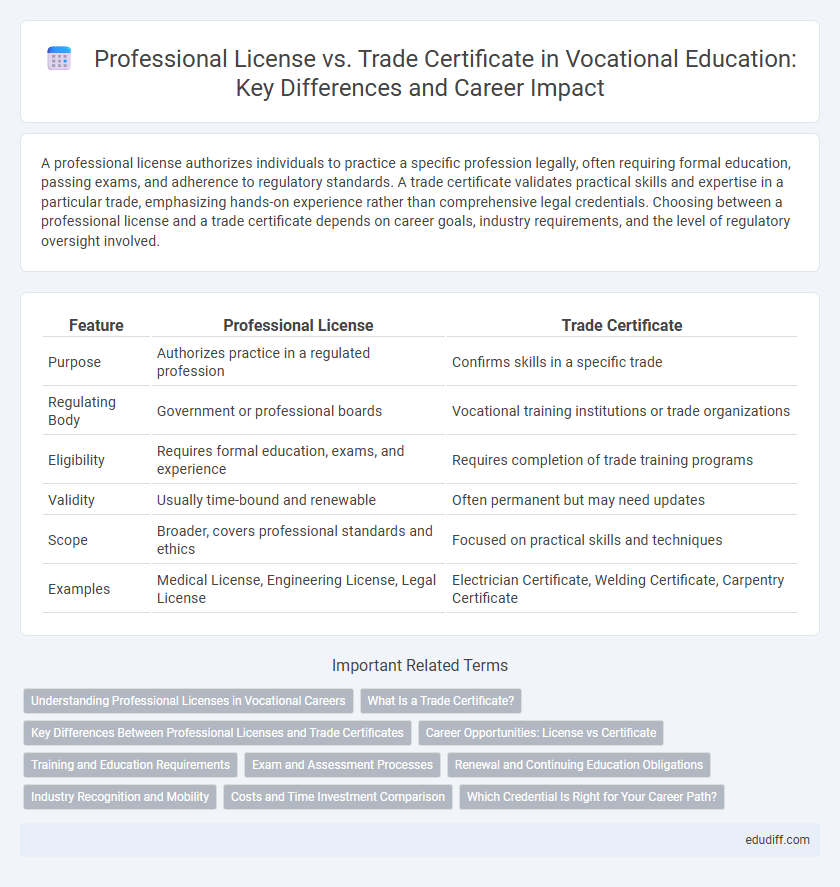A professional license authorizes individuals to practice a specific profession legally, often requiring formal education, passing exams, and adherence to regulatory standards. A trade certificate validates practical skills and expertise in a particular trade, emphasizing hands-on experience rather than comprehensive legal credentials. Choosing between a professional license and a trade certificate depends on career goals, industry requirements, and the level of regulatory oversight involved.
Table of Comparison
| Feature | Professional License | Trade Certificate |
|---|---|---|
| Purpose | Authorizes practice in a regulated profession | Confirms skills in a specific trade |
| Regulating Body | Government or professional boards | Vocational training institutions or trade organizations |
| Eligibility | Requires formal education, exams, and experience | Requires completion of trade training programs |
| Validity | Usually time-bound and renewable | Often permanent but may need updates |
| Scope | Broader, covers professional standards and ethics | Focused on practical skills and techniques |
| Examples | Medical License, Engineering License, Legal License | Electrician Certificate, Welding Certificate, Carpentry Certificate |
Understanding Professional Licenses in Vocational Careers
Professional licenses in vocational careers validate specialized skills and legal authorization to perform regulated tasks, ensuring public safety and compliance with industry standards. Unlike trade certificates that primarily demonstrate completion of training programs, professional licenses often require passing rigorous exams, ongoing education, and adherence to ethical codes. These credentials are critical in fields such as healthcare, construction, and automotive services, where competency directly impacts consumer trust and career advancement.
What Is a Trade Certificate?
A trade certificate is an official document certifying that an individual has completed specific training or apprenticeship in a skilled trade, such as plumbing, electrical work, or welding. This certification demonstrates practical proficiency and hands-on experience required to perform trade-related tasks safely and effectively. Unlike a professional license, which is often mandated by government authorities for legal practice, a trade certificate primarily validates vocational competence and readiness for employment in a trade sector.
Key Differences Between Professional Licenses and Trade Certificates
Professional licenses typically require passing rigorous exams and meeting specific educational criteria to ensure compliance with industry standards and legal regulations. Trade certificates emphasize practical skills and hands-on training, often awarded upon completion of apprenticeships or vocational courses, highlighting proficiency in a particular trade. The key difference lies in the legal authority conferred; professional licenses grant permission to practice regulated professions, while trade certificates validate competence without necessarily providing legal licensing.
Career Opportunities: License vs Certificate
Professional licenses often open doors to regulated careers such as healthcare, engineering, and law, where legal authorization is mandatory for practice. Trade certificates typically provide specialized skills recognition in sectors like construction, plumbing, and electrical work, enhancing employability in hands-on roles without the requirement of state-issued licenses. Career advancement tends to align with the level of credentialing, as licenses can allow for higher responsibility and autonomy, whereas certificates emphasize technical competency and immediate job readiness.
Training and Education Requirements
Professional licenses often require extensive formal education, including completion of accredited degree programs and passing rigorous state or national examinations. Trade certificates typically emphasize hands-on training through vocational schools or apprenticeship programs, focusing on practical skills development over theoretical coursework. Both credentials demand specific training hours and competency assessments tailored to their respective industries.
Exam and Assessment Processes
Professional licenses typically require comprehensive examinations that assess both theoretical knowledge and practical skills relevant to regulated industries such as healthcare, engineering, or law. Trade certificates often involve hands-on assessments and skill demonstrations directly related to specific trades like carpentry, plumbing, or electrical work, ensuring competence in applied tasks. Exam formats for professional licenses may include written, oral, and situational tests, while trade certificates prioritize practical exams and on-the-job performance evaluations.
Renewal and Continuing Education Obligations
Professional licenses typically require periodic renewal involving proof of continuing education credits to ensure practitioners maintain industry standards and updated skills. Trade certificates often have less stringent renewal processes but may still mandate participation in short courses or refresher training to retain credential validity. Both credential types emphasize ongoing education to promote competence and adapt to evolving vocational demands.
Industry Recognition and Mobility
Professional licenses often provide broader industry recognition and higher mobility across states and countries due to standardized regulatory requirements. Trade certificates, while valuable for demonstrating specific technical skills, typically offer limited recognition outside the issuing authority or region. Employers frequently prioritize professional licenses for roles demanding compliance with legal or safety standards, enhancing career advancement opportunities.
Costs and Time Investment Comparison
Professional licenses often require a higher financial investment, with costs ranging from $200 to $1,000 for application and renewal fees, while trade certificates typically cost between $100 and $500. Time investment for obtaining a professional license can extend from six months to several years due to rigorous training and examination requirements, whereas trade certificates usually take a few weeks to a few months to complete. Employers often value professional licenses for specialized roles, whereas trade certificates are sufficient for many skilled trades, reflecting the differences in cost and time commitment.
Which Credential Is Right for Your Career Path?
Choosing between a professional license and a trade certificate depends on career goals and industry requirements. A professional license, often mandatory in fields like healthcare or engineering, certifies competency and legal permission to practice, while a trade certificate demonstrates practical skills essential for trades such as plumbing, electrical work, or carpentry. Evaluating industry demand, job responsibilities, and state regulations ensures the credential aligns with your vocational path and long-term career advancement.
Professional License vs Trade Certificate Infographic

 edudiff.com
edudiff.com